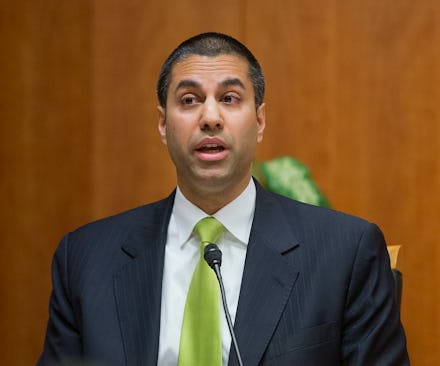FCC chair argues Twitter bans, not net neutrality, are the real threat to the internet

With the Federal Communications Commission expected to end net neutrality as we know it in the near future, chairman Ajit Pai is coming up with new creative ways to defend the unpopular decision.
His latest argument plays directly into one of conservatives’ favorite causes — attacking Twitter’s “hateful conduct policy.”
“Now look: I love Twitter,” Pai said at an event in Washington, D.C. “But let’s not kid ourselves; when it comes to a free and open Internet, Twitter is a part of the problem. The company has a viewpoint and uses that viewpoint to discriminate.”
Conservative activists online have decried the terms of service agreements on Twitter and other social media sites in recent years, arguing that sites use their anti-harassment policies to censor them. The most infamous of those cases was Twitter’s decision to ban right-wing provocateur Milo Yiannopoulos after he waged a racist campaign against comedian Leslie Jones.
Pai is arguing the FCC’s decision to allow internet service providers to determine which websites and content users can view is somehow akin to efforts to curb harassment.
“Unfortunately, Twitter is not an outlier,” Pai said. “Indeed, despite all the talk and all the fear that broadband providers could decide what internet content consumers can see, recent experience shows that so-called edge providers are, in fact, deciding what content they see. These providers routinely block or discriminate against content they don’t like.”
But Pai’s equating of terms of service agreements to the FCC’s decision to end net neutrality scarcely stands up to scrutiny.
Under Pai’s proposed changes to net neutrality laws, ISPs like Comcast or Time Warner could censor content from companies with competing interests in order to benefit their own bottom lines. Let’s say a popular sports site is streaming a boxing match at the same time a TV network owned by a major ISP is set to air a major NFL game. The new rules would allow that ISP to slow the broadband speed for that boxing match to ensure more viewers watch the football game.
That’s hardly akin to censoring offensive or threatening content that sites promise to regulate in predetermined agreements with their users.
What’s more, as Mic has previously reported, social media sites have actually proven woefully reluctant to use their censorship powers even for overt kinds of harassment. Facebook’s reluctance to restrict what users see has even become a major concern among lawmakers attempting to combat the spread of fake news.
And while social media sites like Facebook have gained outsized power and influence over the past decade, they’re not the only game in town. Internet users can still choose from an array of social media sites, while few have a choice in which company provides them with access to the web.